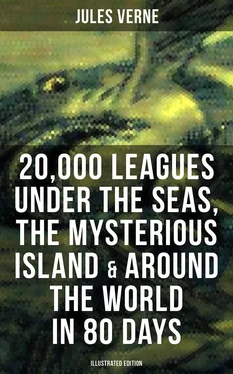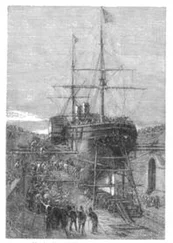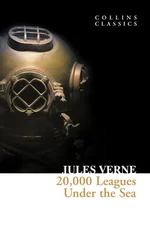As for me, I didn’t lag behind the others and I yielded to no one my share in these daily observations. Our frigate would have had fivescore good reasons for renaming itself the Argus, after that mythological beast with 100 eyes! The lone rebel among us was Conseil, who seemed utterly uninterested in the question exciting us and was out of step with the general enthusiasm on board.
As I said, Commander Farragut had carefully equipped his ship with all the gear needed to fish for a gigantic cetacean. No whaling vessel could have been better armed. We had every known mechanism, from the hand-hurled harpoon, to the blunderbuss firing barbed arrows, to the duck gun with exploding bullets. On the forecastle was mounted the latest model breech-loading cannon, very heavy of barrel and narrow of bore, a weapon that would figure in the Universal Exhibition of 1867. Made in America, this valuable instrument could fire a four-kilogram conical projectile an average distance of sixteen kilometers without the least bother.
So the Abraham Lincoln wasn’t lacking in means of destruction. But it had better still. It had Ned Land, the King of Harpooners.
Gifted with uncommon manual ability, Ned Land was a Canadian who had no equal in his dangerous trade. Dexterity, coolness, bravery, and cunning were virtues he possessed to a high degree, and it took a truly crafty baleen whale or an exceptionally astute sperm whale to elude the thrusts of his harpoon.
Ned Land was about forty years old. A man of great height—over six English feet—he was powerfully built, serious in manner, not very sociable, sometimes headstrong, and quite ill-tempered when crossed. His looks caught the attention, and above all the strength of his gaze, which gave a unique emphasis to his facial appearance.
Commander Farragut, to my thinking, had made a wise move in hiring on this man. With his eye and his throwing arm, he was worth the whole crew all by himself. I can do no better than to compare him with a powerful telescope that could double as a cannon always ready to fire.
To say Canadian is to say French, and as unsociable as Ned Land was, I must admit he took a definite liking to me. No doubt it was my nationality that attracted him. It was an opportunity for him to speak, and for me to hear, that old Rabelaisian dialect still used in some Canadian provinces. The harpooner’s family originated in Quebec, and they were already a line of bold fishermen back in the days when this town still belonged to France.
Little by little Ned developed a taste for chatting, and I loved hearing the tales of his adventures in the polar seas. He described his fishing trips and his battles with great natural lyricism. His tales took on the form of an epic poem, and I felt I was hearing some Canadian Homer reciting his Iliad of the High Arctic regions.
I’m writing of this bold companion as I currently know him. Because we’ve become old friends, united in that permanent comradeship born and cemented during only the most frightful crises! Ah, my gallant Ned! I ask only to live 100 years more, the longer to remember you!
And now, what were Ned Land’s views on this question of a marine monster? I must admit that he flatly didn’t believe in the unicorn, and alone on board, he didn’t share the general conviction. He avoided even dealing with the subject, for which one day I felt compelled to take him to task.
During the magnificent evening of June 25—in other words, three weeks after our departure—the frigate lay abreast of Cabo Blanco, thirty miles to leeward of the coast of Patagonia. We had crossed the Tropic of Capricorn, and the Strait of Magellan opened less than 700 miles to the south. Before eight days were out, the Abraham Lincoln would plow the waves of the Pacific.
Seated on the afterdeck, Ned Land and I chatted about one thing and another, staring at that mysterious sea whose depths to this day are beyond the reach of human eyes. Quite naturally, I led our conversation around to the giant unicorn, and I weighed our expedition’s various chances for success or failure. Then, seeing that Ned just let me talk without saying much himself, I pressed him more closely.
“Ned,” I asked him, “how can you still doubt the reality of this cetacean we’re after? Do you have any particular reasons for being so skeptical?”
The harpooner stared at me awhile before replying, slapped his broad forehead in one of his standard gestures, closed his eyes as if to collect himself, and finally said:
“Just maybe, Professor Aronnax.”
“But Ned, you’re a professional whaler, a man familiar with all the great marine mammals—your mind should easily accept this hypothesis of an enormous cetacean, and you ought to be the last one to doubt it under these circumstances!”
“That’s just where you’re mistaken, professor,” Ned replied. “The common man may still believe in fabulous comets crossing outer space, or in prehistoric monsters living at the earth’s core, but astronomers and geologists don’t swallow such fairy tales. It’s the same with whalers. I’ve chased plenty of cetaceans, I’ve harpooned a good number, I’ve killed several. But no matter how powerful and well armed they were, neither their tails or their tusks could puncture the sheet-iron plates of a steamer.”
“Even so, Ned, people mention vessels that narwhale tusks have run clean through.”
“Wooden ships maybe,” the Canadian replied. “But I’ve never seen the like. So till I have proof to the contrary, I’ll deny that baleen whales, sperm whales, or unicorns can do any such thing.”
“Listen to me, Ned—”
“No, no, professor. I’ll go along with anything you want except that. Some gigantic devilfish maybe … ?”
“Even less likely, Ned. The devilfish is merely a mollusk, and even this name hints at its semiliquid flesh, because it’s Latin meaning soft one. The devilfish doesn’t belong to the vertebrate branch, and even if it were 500 feet long, it would still be utterly harmless to ships like the Scotia or the Abraham Lincoln. Consequently, the feats of krakens or other monsters of that ilk must be relegated to the realm of fiction.”
“So, Mr. Naturalist,” Ned Land continued in a bantering tone, “you’ll just keep on believing in the existence of some enormous cetacean … ?”
“Yes, Ned, I repeat it with a conviction backed by factual logic. I believe in the existence of a mammal with a powerful constitution, belonging to the vertebrate branch like baleen whales, sperm whales, or dolphins, and armed with a tusk made of horn that has tremendous penetrating power.”
“Humph!” the harpooner put in, shaking his head with the attitude of a man who doesn’t want to be convinced.
“Note well, my fine Canadian,” I went on, “if such an animal exists, if it lives deep in the ocean, if it frequents the liquid strata located miles beneath the surface of the water, it needs to have a constitution so solid, it defies all comparison.”
“And why this powerful constitution?” Ned asked.
“Because it takes incalculable strength just to live in those deep strata and withstand their pressure.”
“Oh really?” Ned said, tipping me a wink.
“Oh really, and I can prove it to you with a few simple figures.”
“Bosh!” Ned replied. “You can make figures do anything you want!”
“In business, Ned, but not in mathematics. Listen to me. Let’s accept that the pressure of one atmosphere is represented by the pressure of a column of water thirty-two feet high. In reality, such a column of water wouldn’t be quite so high because here we’re dealing with salt water, which is denser than fresh water. Well then, when you dive under the waves, Ned, for every thirty-two feet of water above you, your body is tolerating the pressure of one more atmosphere, in other words, one more kilogram per each square centimeter on your body’s surface. So it follows that at 320 feet down, this pressure is equal to ten atmospheres, to 100 atmospheres at 3,200 feet, and to 1,000 atmospheres at 32,000 feet, that is, at about two and a half vertical leagues down. Which is tantamount to saying that if you could reach such a depth in the ocean, each square centimeter on your body’s surface would be experiencing 1,000 kilograms of pressure. Now, my gallant Ned, do you know how many square centimeters you have on your bodily surface?”
Читать дальше












